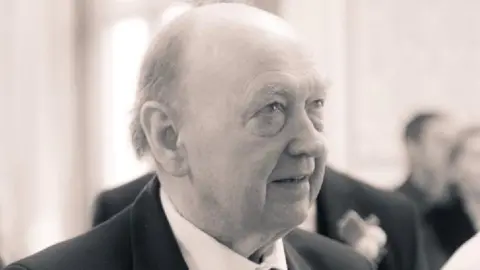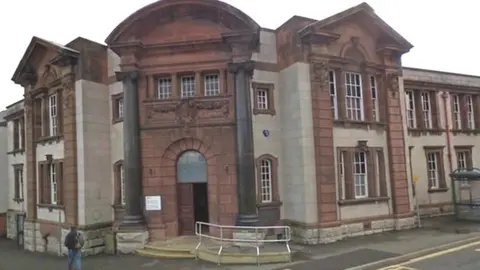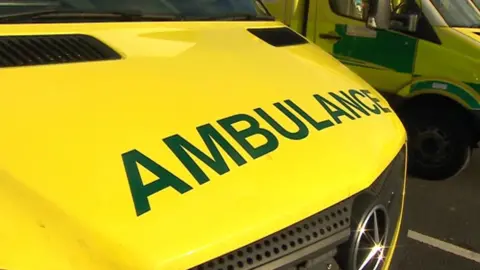Man died 16 hours after 999 call for ambulance in Llandegla
 Family photo
Family photoA 74-year-old man died while waiting 16 hours for an ambulance, an inquest heard.
Joseph Edge's wife, Carole, called 999 in December 2019, worried about his low blood pressure, the hearing was told.
The ambulance service was facing "unprecedented" demand at the time and his case was not listed as a "red" priority, the inquest in Ruthin heard.
Call handlers went on to ring every two hours to "apologise and say they were busy", said Ms Edge from Denbighshire.
A post-mortem examination concluded Mr Edge's heart was enlarged and a main artery was blocked.
Dr Brian Rodgers, a Home Office pathologist, said Mr Edge "could have died at any time".
"A prompter response from the ambulance service may have led to a different outcome but I can't be certain," he wrote in a statement.
Elizabeth Dudley Jones, the assistant coroner for North Wales East and Central, concluded Mr Edge died of natural causes.
She said that, while patients with similar health problems could die at any time, she felt he was denied the opportunity for medical treatment which may have made a difference.
 Google
GoogleGrandfather Mr Edge, a former plumber and mechanic who had retired early after suffering a heart attack and stroke at 48, died at his home in Llandegla.
The hearing was told he had fallen the day before and suffered a cut to his head, and a low blood pressure reading prompted his wife to call NHS Direct for advice.
But she gave up after several attempts to get through and called an out-of-hours number for their GP surgery and was then advised to dial 999.
The inquest in Ruthin was told she initially called for an ambulance at 13:15 GMT and by 17:15 "they moved him up the list to urgent but they were still very busy".
"The last call I received was around 3:15am," said Ms Edge's statement.

Anticipating the arrival of an ambulance at 05:15 she went upstairs and found her husband "cold and unresponsive", she said.
"I phoned 999 again and a paramedic arrived within half an hour," she said.
"I'm very upset and annoyed about what has happened."
The hearing was told how 999 ambulance calls coded "red" had an eight-minute response time target but there was no set time for any other category of calls.
Mr Edge's case was coded as "green 3" but the call handler miscategorised the chief complaint, instead of prioritising "near fainting" as a main symptom or a "green 2 category" which meant the handler asked a different series of questions.
Welsh Ambulance Service manager Gill Pleming, who gave evidence in person, said that even if he had been correctly categorised he would have been treated the same with priority but he would have received a clinical telephone assessment.
All resources were allocated to other incidents or at hospitals with 41 emergency cases being dealt with at 13:27, she said.
At 17:42, a clinician reviewed the call and, after hearing Mr Edge's latest blood pressure reading, his call was reprioritised to an urgent "amber 2".
The hearing was told ambulance service welfare calls continued until 03:33 but resources were still unavailable until a paramedic in a rapid response vehicle attended at 05:55.
'Unacceptable delay'
Claire Roche, the Welsh Ambulance Service's executive director of quality and nursing, said: "We extend our deepest sympathies to Mr Edge's family at what we know will be a sad and difficult time.
"We acknowledge the coroner's conclusions and sincerely apologise to Mr Edge's family for what we agree was an unacceptable delay.
"We are an organisation committed to learning and will continue to work with the health board to improve our timeliness to respond to people when they need us."
